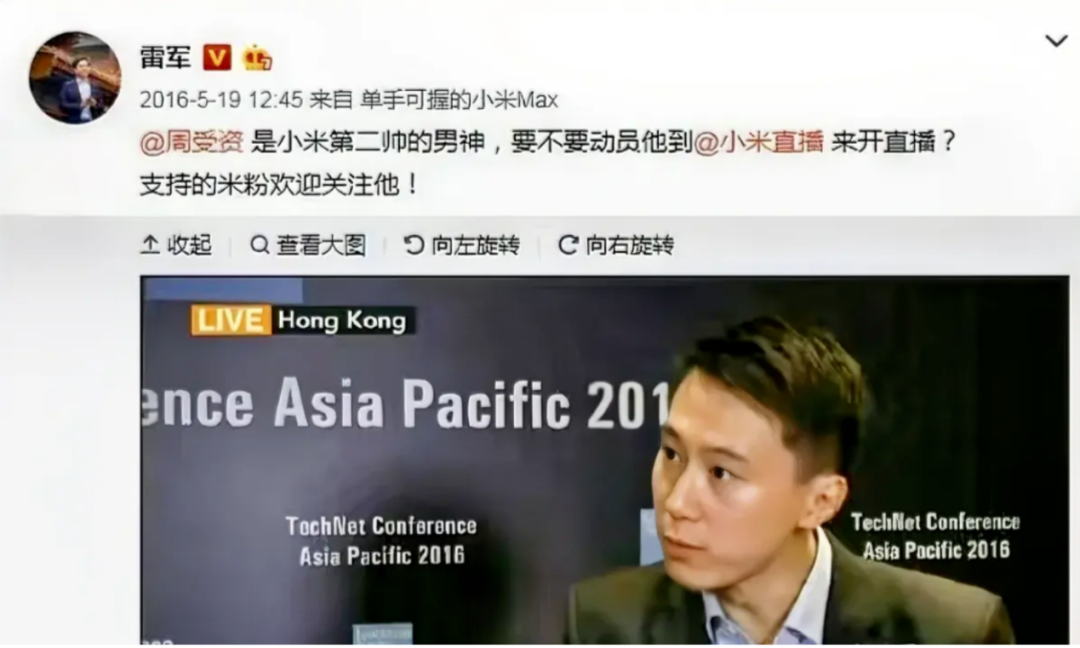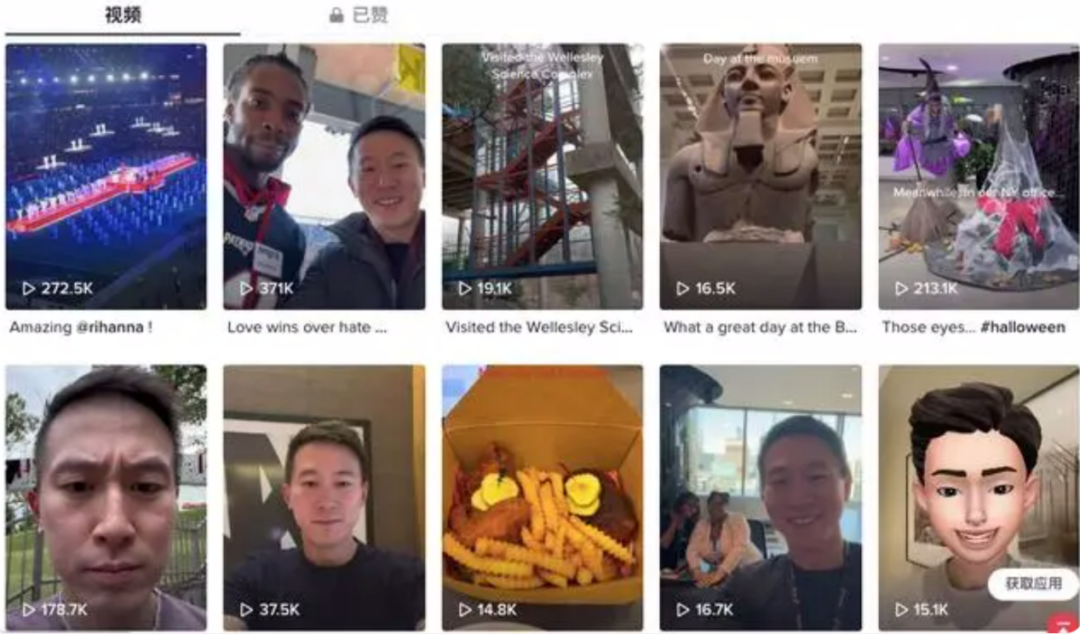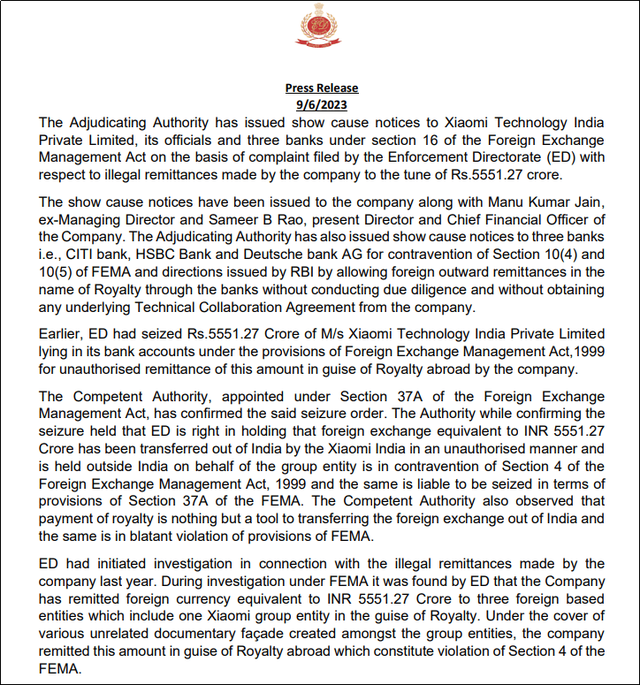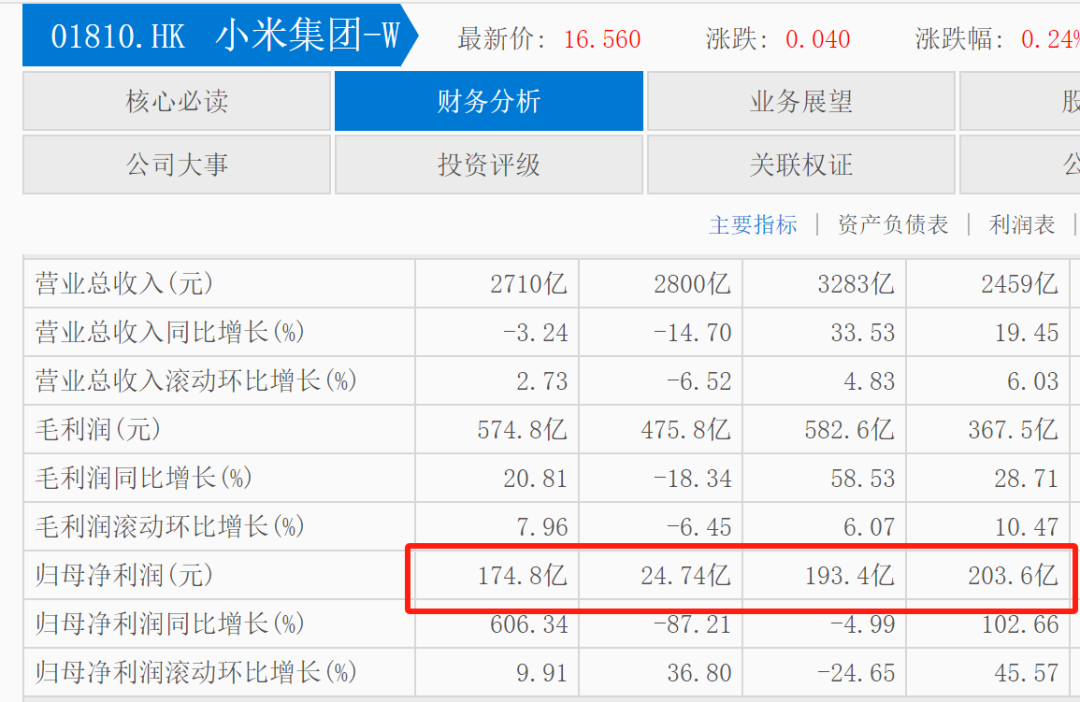Lei Jun Misses Shouzi Zhou So Much, What Does Lu Weibing Think?
![]() 07/24 2024
07/24 2024
![]() 661
661
Lei Jun once again mentioned Shouzi Zhou and expressed his reluctance to let him go.
On July 19th, Xiaomi founder Lei Jun held his 5th annual speech. During the three-hour speech, Lei Jun highlighted Shouzi Zhou. Lei Jun said in his speech that Zhou, as a young executive who had been cultivated for many years and was highly anticipated, his departure came as a rude awakening.
Yes, it's the same Shouzi Zhou who previously attended the US Congress hearing as TikTok's CEO. At that time, this elegant 40-year-old president, facing various difficulties from American senators, engaged in a verbal battle with grace and impeccability, perfectly demonstrating to the strong and arrogant Americans what is the coexistence of Eastern demeanor and wisdom.

When Shouzi Zhou first joined Xiaomi in 2015, Lei Jun commented, "He was a successful investor before, with unique insights and professional financial skills. He discovered Xiaomi's value early on and led the completion of DST's investment." Four years after joining Xiaomi, Zhou became President of Xiaomi's International Department, and in 2020, he became Xiaomi's youngest group partner. At that time, Lei Jun had high hopes for Zhou and often jokingly called him "Xiaomi's second most handsome man," with himself being the first, and joked that men more handsome than him were fired.

In March 2021, Zhou announced his departure from Xiaomi due to family reasons, but on the same day, he joined ByteDance as CFO. Soon after, he became CEO of TikTok. In a sense, Zhou's move was a natural progression to higher ground. Lei Jun's nostalgia and reluctance, still strong after 3 years and 4 months, indicates his high regard for Zhou. Although he did not publicly state that Zhou was his successor, Lei Jun's words of high hopes and years of cultivation suggest that he may have indeed been grooming Zhou as his successor. After Lei Jun's speech, it successfully refocused attention on Zhou and drew the attention of the capital market. On the first trading day after Lei Jun's speech, with no significant moves or good news from Xiaomi, Xiaomi's share price rose 4.24%, a new single-day high in nearly a month. As of July 22's close, Xiaomi's latest market value was HK$429.8 billion.

1
On one side is Lei Jun, on the other is Zhang Yiming
Both Lei Jun and Zhang Yiming are business tycoons, and both rank high on the Forbes Rich List. Lei Jun ranks 14th on the 2024 New Fortune 500 Wealth Creation List with a shareholding value of RMB 102.5 billion. Zhang Yiming's wealth decreased by 8%, and his global ranking dropped by 6 places, but he still ranks 4th in China and 40th globally, both super-rich individuals. That Zhou Shouzi is favored by both Lei Jun and Zhang Yiming speaks to his exceptional abilities.
At 41 years old, Zhou Shouzi is 14 years younger than Lei Jun and was born in the same year as Zhang Yiming, 1983. His ancestral home is in Chaoshan, Guangdong, but he was born in Singapore. His mother is an accountant, and his father owns a construction company, so he comes from a wealthy background, a second-generation rich kid. However, his days as a rich kid were short-lived. Due to poor management, his father's business faced crises several times, going from overnight riches to nothing. At the age of 12, Zhou Shouzi excelled in the Singapore national examinations and attended Hwa Chong Institution, an elite school in Singapore. At 18, he interrupted his studies to join the Singapore Air Force, where he served for two years, rising to the rank of Captain before retiring.
During his military service, Zhou Shouzi did not stop learning. Immediately after retiring, he studied hard and was admitted to University College London (UCL). After graduating, he worked for two years at the prestigious investment bank Goldman Sachs. In 2008, Zhou Shouzi pursued a master's degree at Harvard Business School and moved to the United States. After graduating from Harvard Business School, Zhou Shouzi embarked on a remarkable career, joining Russian internet investment giant DST Global and quickly rising to the position of DST China Partner.
Around 2010, Chinese internet companies entered a period of explosive growth. As DST China's partner, Zhou Shouzi keenly sensed significant business opportunities. With his help, Liu Qiangdong and DST Milner completed their first meeting, which officially kicked off JD.com's rapid development. At that time, DST invested $500 million, acquiring an 8.8% stake in JD.com. Given JD.com's growth rate, this was a highly profitable investment, and Zhou Shouzi gained fame in the investment community as a result.
Subsequently, DST also acquired a 7% stake in Xiaomi for $500 million. Even when Zhang Yiming was still working out of a residential building in Jinqiu Homestead, he had already met Zhou Shouzi, who played a crucial role in DST's key investment in ByteDance. As such, the three major internet companies JD.com, Xiaomi, and ByteDance are all inextricably linked to Zhou Shouzi.
With his outstanding abilities and network, 32-year-old Zhou Shouzi successfully captured Lei Jun's attention, who extended an olive branch to him. Zhou Shouzi, who was also optimistic about Xiaomi, gladly accepted the position of Xiaomi's CFO, becoming Xiaomi's youngest executive. To lure Zhou Shouzi, Lei Jun offered him 100 million Xiaomi options. Lei Jun described him at the time as "having a kind of diligence that is like revenge on the world."
Xiaomi's path to going public was far more difficult than anyone imagined. In the operator era, Xiaomi faced industry giants like ZTE, Coolpad, Lenovo, and Huawei. With its unique business model of cost-effectiveness, internet thinking, and hardware-software integration, Xiaomi forcibly entered the mobile phone market, but it also attracted much criticism. In 2014, Xiaomi was valued at $45 billion, making it the world's largest technology startup at the time. However, it struggled to go public. After Zhou Shouzi joined, he began overseeing Xiaomi's IPO journey. During the preparation period, Zhou Shouzi often worked tirelessly, recording every investor he met in an Excel spreadsheet, eventually listing 1500 rows.
In this way, it took Zhou Shouzi three years for Xiaomi to successfully list in Hong Kong in 2018, becoming the first company with different voting rights for the same share in the Hong Kong Stock Exchange, a highly complex situation. Zhou Shouzi successfully resolved this challenge while also driving the rise of Xiaomi's ecosystem chain and global layout. Xiaomi's international business expanded to more than 100 countries and regions, significantly contributing to Xiaomi's internationalization journey. In 2020, Zhou Shouzi became Xiaomi's youngest group partner.
In March 2021, Zhou Shouzi left Xiaomi to join ByteDance. Of course, Zhang Yiming was not poaching talent to weaken Xiaomi but due to ByteDance's own development needs. After joining ByteDance, Zhou Shouzi led the TikTok team to expand globally, especially almost dominating the US market, with almost half of Americans becoming active TikTok users, prompting the US to both love and fear it, leading to various targeted actions.
2
It's Not About Money or Being Wronged
Theoretically, Lei Jun placed considerable importance on Zhou Shouzi, making him a board member and partner, offering a sky-high salary and 100 million options. In his thirties, he had already surpassed most of his peers worldwide. In September 2021, Zhou Shouzi was selected as one of the "Fortune 40 Under 40" business elites. With fame and fortune, it was widely believed that if Zhou Shouzi stayed at Xiaomi, he would succeed Lei Jun.
Lei Jun surely felt reluctant about Zhou Shouzi's departure but still offered his blessings. Shortly after Zhou Shouzi joined TikTok, he cleared his Twitter and other social media accounts and opened a TikTok account. To expand TikTok's overseas market, Zhou Shouzi changed his usually rigorous work style to a more westernized and lifestyle-oriented image. Celebrating Halloween, eating fried chicken and drinking coke, attending concerts... These actions did play a role in promoting TikTok's development. With the rapid development of TikTok's international business, in 2022, Zhou Shouzi was selected for the "2022 Forbes China Global Chinese Elite Top 100" list.

Before Zhou Shouzi joined TikTok, being TikTok's CEO was the most dangerous job in the industry, with five CEOs in five years, the shortest tenure lasting only three months. When Zhou Shouzi took over TikTok, the US government was eyeing TikTok intently. The crisis was temporarily lifted after Trump's defeat, but the US investigation of TikTok did not truly disappear. The previous CEO could not withstand the pressure, leading to Zhou Shouzi's famous scene of engaging in a verbal battle with lawmakers at the hearing.

At the hearing, bipartisan lawmakers grilled Zhou Shouzi with aggressive and inductive questions, often rudely interrupting him with "Just answer 'yes' or 'no.'" Despite this, Zhou Shouzi maintained his composure and responded clearly and calmly, earning him fame in the global Chinese community. Jack Ma once famously said, "When a senior executive leaves, it's either because they've been wronged or they haven't been paid enough."
At the time, Zhou Shouzi was considered a "scarce talent" by both Xiaomi and the outside world, and Lei Jun actively promoted him. The possibility of being wronged was not high. Some believe that Lei Jun is a more traditional business manager who cultivates successors step by step, while Zhou Shouzi received a Western education from an early age and may not be suited to such a cultivation process.
This can be seen from the fact that Zhang Yiming immediately appointed Zhou Shouzi as TikTok's CEO upon joining, indicating that Zhou Shouzi may be more eager to take on challenging decision-making management roles.
Could Zhou Shouzi's departure be due to salary issues? Public information shows that Zhou Shouzi's annual salary at Xiaomi was RMB 700 million, while at ByteDance, it was RMB 960 million. This means that by switching to ByteDance, Zhou Shouzi's salary increased by nearly 40%, an offer that most people would find hard to refuse. However, it's important to remember that Zhou Shouzi also had 100 million Xiaomi options, which, compared to a less than 40% salary increase, is hardly a decisive factor. Zhou Shouzi's wife, Wei-yen Kao, also graduated from Harvard Business School and is a female business elite, serving as an independent non-executive director of Hong Kong financial firm Sun Hung Kai Properties, Chairperson of the ESG Committee, and CEO and Head of Tamarind Global. The couple has long since achieved financial freedom. Therefore, it's unlikely that salary was the reason for Zhou Shouzi's departure.
Investor Liu Bo believes that when business elites leave their jobs, if it's not for salary, the most likely reason is the desire to prove themselves: "Zhou Shouzi was only a senior vice president at Xiaomi, and Lei Jun likes to take matters into his own hands, leaving little room for Zhou to shine. After joining ByteDance, he quickly became TikTok's CEO. Compared to Lei Jun, Zhang Yiming prefers to delegate authority, which may be the key reason for Zhou Shouzi's departure."
Liu Bo also pointed out that Lei Jun's public discussion of Zhou Shouzi was inappropriate, as it may affect the mindset of Xiaomi's current executives. Instead of missing Zhou Shouzi, Lei Jun could publicly thank Xiaomi's other contributor, Lu Weibing, which may boost team morale.
3
Xiaomi Still Needs Zhou Shouzi for Internationalization
Lei Jun has always emphasized that Xiaomi is a highly international company, but since Zhou Shouzi's departure, Xiaomi's international business progress has not been smooth.
First, Italy imposed a fine of RMB 21.76 million on Xiaomi, and then there were troubles in India. In a document released on June 9, 2023, the Enforcement Directorate of India alleged that Xiaomi violated the country's Foreign Exchange Management Act (FEMA) by "illegally transferring funds to foreign entities." The authority has issued formal notices to Xiaomi Technology India Private Limited, Xiaomi India, some executives, and three banks, including Citibank.

As a result of these allegations, Indian authorities seized a total of INR 55.51 billion (about US$680 million, equivalent to nearly RMB 5 billion) from Xiaomi. Public data shows that Xiaomi Group's adjusted net profit for 2022 was RMB 8.5 billion, meaning this seized amount is equivalent to 57% of Xiaomi's 2022 net profit. Xiaomi's financial report shows that its net profit attributable to shareholders in 2022 was only RMB 2.474 billion. Whether this was affected by the Indian issue is not explained in the financial report. In 2023, Xiaomi's net profit attributable to shareholders was RMB 17.48 billion, with the cost of the Indian issue accounting for about 30% of the full-year net profit.

Relevant data shows that Xiaomi's overseas revenue in 2021 reached RMB 163.6 billion, an increase of 33.7% year-on-year, accounting for 49.8% of total revenue. In 2022, Xiaomi's overseas revenue was RMB 137.8 billion, accounting for 49.2% of total revenue. In 2023, Xiaomi's overseas revenue was RMB 121.8 billion, accounting for 44.9% of total revenue. For three consecutive years, Xiaomi's overseas revenue share has decreased rather than increased, indicating that Xiaomi's internationalization process has not been smooth.
In 2023, Xiaomi's smartphone revenue reached 157.5 billion yuan, a year-on-year decrease of 5.8%, while global shipments of Xiaomi smartphones decreased by 3.3% year-on-year. In the fourth quarter of 2023, Xiaomi's smartphone revenue ended a seven-quarter streak of year-on-year declines. During this quarter, smartphone revenue accounted for 60.4% of the total revenue, marking the first time in four quarters that it exceeded 60%. However, this was achieved through price reductions. In 2022, the average selling price (ASP) of Xiaomi smartphones in overseas markets was 1,111.3 yuan per unit, which decreased to 1,081.7 yuan per unit in 2023.
A detailed analysis of Xiaomi's financial report reveals that the growth is driven by the push towards high-end models in the domestic market, while the decline is due to overseas promotions to clear inventory and increased shipments to emerging markets. However, part of this decline was offset by the increase in domestic ASP. This means that Xiaomi's high-end strategy is not progressing smoothly in overseas markets; the high-end user base that Lei Jun mentioned continues to come from domestic users. It is doubtful that sales in emerging overseas markets will significantly boost Xiaomi's overall smartphone revenue.
Xiaomi's international expansion urgently needs a key manager, causing Lei Jun to deeply miss Zhou Shouzi, who had been a valuable "right-hand man" with rich experience in international expansion.
Former Google executive Hugo Barra once commented on Zhou Shouzi: "He is more suited than anyone else I've encountered in China's business world to serve as a dual-role executive for a Chinese company aspiring to become a global giant, balancing both domestic and international aspects." Lei Jun certainly recognizes Zhou Shouzi's strengths.
As Rene Liu sings in her song "Later," "Some people, once missed, are gone forever," Lei Jun's current longing for Zhou Shouzi underscores the fact that such a business prodigy is hard to find again.





